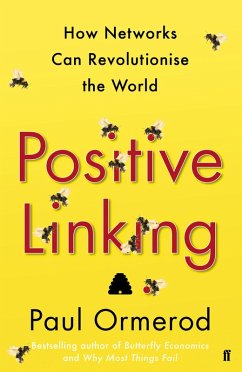According to Paul Ormerod, author of the bestselling Butterfly Economics and Why Most Things Fail, the mechanistic viewpoint of conventional economics is drastically limited - because it cannot comprehend the vital nature of networks. As our societies become ever more dynamic and intertwined, network effects on every level are increasingly profound. 'Nudge theory' is popular, but only part of the answer. To grapple successfully with the current financial crisis, businesses and politicians need to grasp the perils and possibilities of Positive Linking.
Our social and economic worlds have been revolutionised by a massive increase in our awareness of the choices, decisions, behaviours and opinions of other people. For the first time in human history, more than half of us live in cities, and this combined with the Internet has transformed communications. Network effects - the fact that a person can and often does decide to change his or her behaviour simply on the basis of copying what others do - pervade the modern world.
As Ormerod shows, network effects make conventional approaches to policy, whether in the public or corporate sectors, much more likely to fail. But they open up the possibility of truly 'Positive Linking' - of more subtle, effective and successful policies, ones which harness our knowledge of network effects and how they work in practice.
Our social and economic worlds have been revolutionised by a massive increase in our awareness of the choices, decisions, behaviours and opinions of other people. For the first time in human history, more than half of us live in cities, and this combined with the Internet has transformed communications. Network effects - the fact that a person can and often does decide to change his or her behaviour simply on the basis of copying what others do - pervade the modern world.
As Ormerod shows, network effects make conventional approaches to policy, whether in the public or corporate sectors, much more likely to fail. But they open up the possibility of truly 'Positive Linking' - of more subtle, effective and successful policies, ones which harness our knowledge of network effects and how they work in practice.
Dieser Download kann aus rechtlichen Gründen nur mit Rechnungsadresse in A, B, BG, CY, CZ, D, DK, EW, E, FIN, F, GR, H, IRL, I, LT, L, LR, M, NL, PL, P, R, S, SLO, SK ausgeliefert werden.









